
Minister Rose Jackson has told a parliamentary hearing that she is looking into regulating irrigation corporations. Photo: Rose Jackson Facebook.
NSW Water Minister Rose Jackson says she is looking at ways to regulate private irrigation water supply companies, after a NSW MP suggested their behaviour was akin to insider trading.
International news outlet Bloomberg and Region recently reported on explosive claims Deniliquin-based Murray Irrigation Limited (MIL) withheld large amounts of water from desperate farmers during the 2018-19 drought.
At a NSW parliamentary hearing last Wednesday (28 February), Greens MP Cate Faehrmann asked Minister Jackson and her bureaucrats why these claims weren’t being investigated.
“[The department] seem to be saying, ‘Nothing to see here’, it’s fine that Murray Irrigation Limited held massive quantities of water during a drought where people had no water available to them, had to sell up, had to sell their family farm – huge distress, probably worse in some parts,” Ms Faehrmann said.
“That’s a policy issue in terms of the lack of transparency around these irrigation companies.”
Ms Faehrmann also questioned why irrigation water supply companies were able to buy and trade water while viewing the water holdings of their customers – information not available to ordinary farmers.
“It’s essentially insider trading, as you know … can we expect anything from you [to increase transparency]?” she asked.
Insider trading is a term commonly used to describe buying and selling in the stock market to one’s own advantage while accessing confidential information others can’t see.
Ms Jackson said there was no evidence that MIL did anything illegal, but she shared Ms Faehrmann’s “concerns about transparency and accountability”.
“I have asked the Energy and Water Ombudsman to explore whether their jurisdiction may be expanded to include the independent irrigation organisation,” she said.
At present, this Ombudsman, Janine Young, investigates complaints by households regarding their electricity, water and gas companies.
She does not yet have the power to help irrigators concerned about the private corporations that deliver their water and maintain their water supply network.

Energy and Water Ombudsman Janine Young could soon be looking into irrigation corporations. Photo: Facebook.
Ms Jackson said she would also look at other options for regulating irrigation corporations if oversight from the Ombudsman was not possible.
MIL is the largest corporation of its type in Australia, supplying water to about 2100 properties in the southern Riverina.
Its behaviour has faced intense scrutiny since an independent report from water research consultancy Slattery & Johnson found unusually high amounts of water were held within MIL’s own company account and carried over into the next season rather than distributed to struggling farmers.
Slattery & Johnson director Maryanne Slattery has backed calls for more transparency.
“Murray Irrigation holds 60 per cent of all the general security water and nobody can see inside it,” she said. “Even governments and MIL shareholders can’t see inside MIL. There needs to be transparency for anyone to have confidence in the market.”
Region asked MIL whether it conceded its drought practices caused “distress” to farmers, whether it agreed the behaviour of irrigation corporations was akin to insider trading and how it would feel about being within the purview of the Energy and Water Ombudsman.
MIL did not answer any of our questions directly but a company spokeswoman provided this statement: “MIL operates within a highly regulated environment and has clear policies that guide how we operate. MIL is committed to work transparently and openly within current arrangements and will not provide comment on hypothetical changes.”
Original Article published by Oliver Jacques on Region Riverina.












